The Future of the Euphrates River in Syria
A Cradle of Civilization Cries for Help
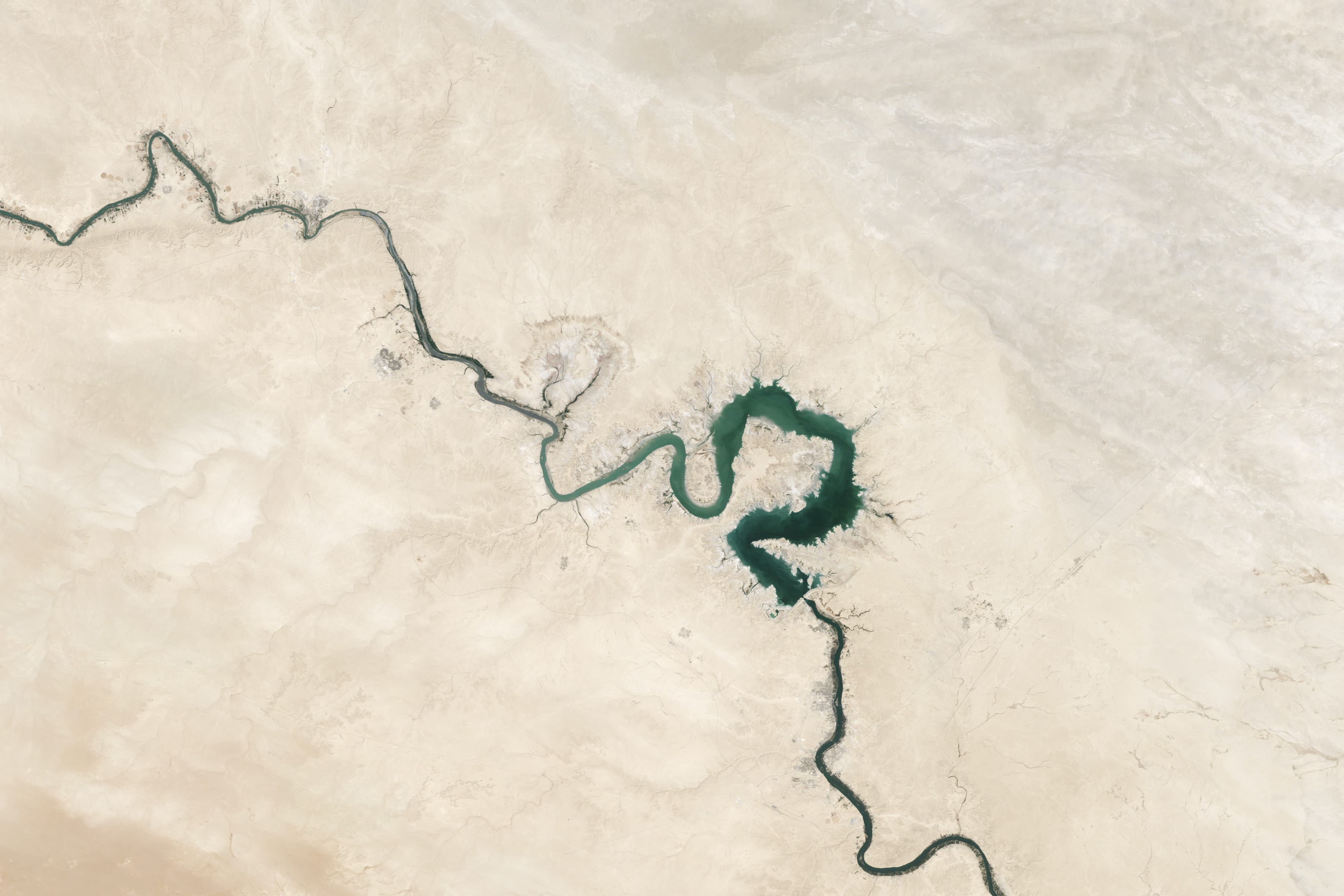
The Euphrates River is at risk of drying up due to climate change.
Temperatures in northeastern Syria have risen by one degree Celsius compared to 100 years ago, and average rainfall has decreased by 18 millimeters per month per century.
The Iraqi Ministry of Water Resources warns that the river could be dry by 2040.
Human impact on the environment could be driving the Euphrates, a cradle of civilization, to destruction, forcing people to leave a place they have called home for thousands of years.
Historically, 85 percent of Syria’s agricultural demand for water has been met by the Euphrates.
People use the river for drinking water, agricultural cultivation, and animal husbandry. The performance of religious ceremonies and the assignation of spiritual qualities to the river help demonstrate the deep bond between the Syrian people and the waterway.
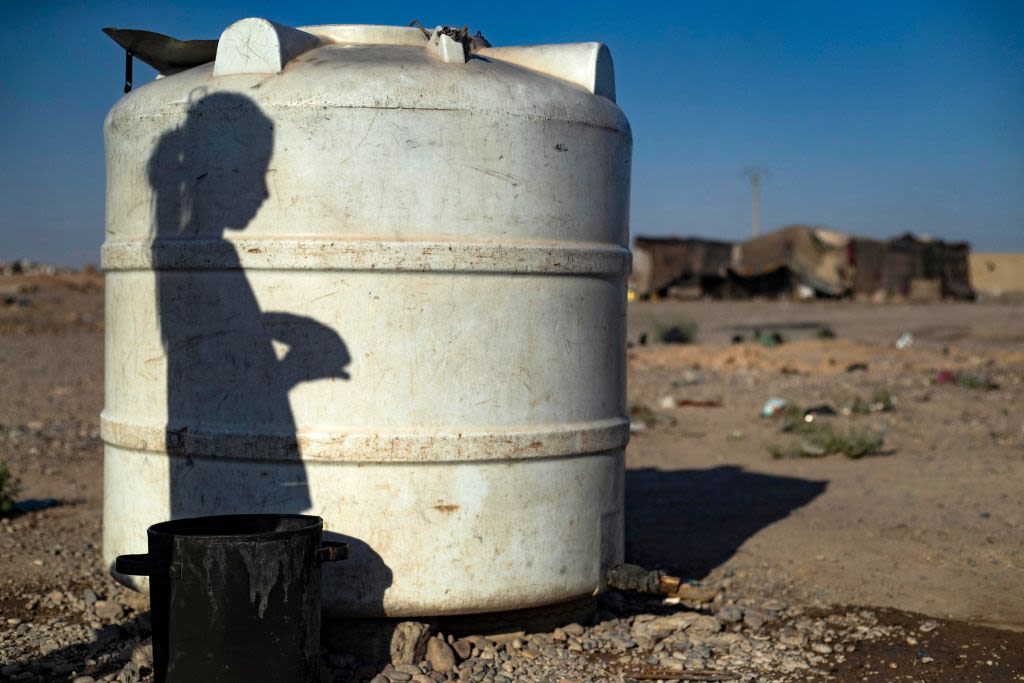
The shadow of a Syrian girl is cast upon a water container at the Sahlah al-Banat camp for displaced people in the countryside of Raqa, in northern Syria, on September 19, 2022. | Delil SOULEIMAN / AFP
The shadow of a Syrian girl is cast upon a water container at the Sahlah al-Banat camp for displaced people in the countryside of Raqa, in northern Syria, on September 19, 2022. | Delil SOULEIMAN / AFP
Now, low water levels have combined with poor quality of water to generate multiple crises, including famine and an outbreak of cholera that has been ongoing since September 2022.
Climate Change Impacts
Over the past decades, the flow in the Euphrates-Tigris River system has decreased to almost half of the average annual flow during dry years. The water levels in the Euphrates are currently at one of their lowest points in recorded history.
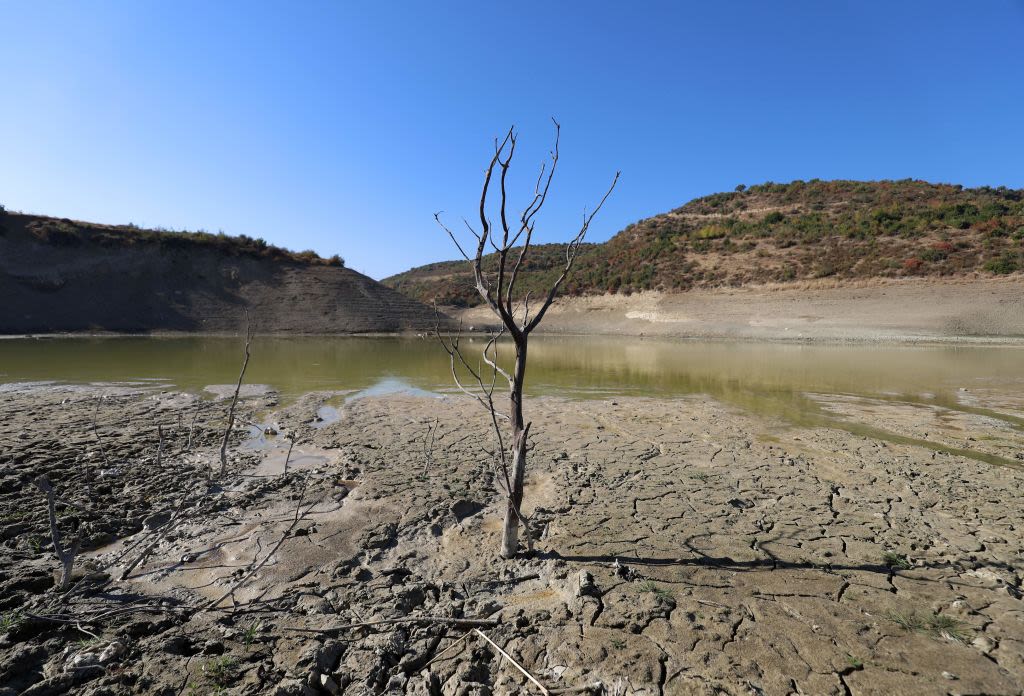
A picture shows drought in the Doueisat (Duwaysat) dam outside the town of al-Diriyah in Syria's northern Idlib province on November 9, 2021. | Abdulaziz KETAZ / AFP
A picture shows drought in the Doueisat (Duwaysat) dam outside the town of al-Diriyah in Syria's northern Idlib province on November 9, 2021. | Abdulaziz KETAZ / AFP
This reduction in water availability, in conjunction with population growth, has furthered water insecurity of downstream countries such as Syria.
Syrian farmers and herders are most impacted by these droughts, which leaves them in a precarious position, with many rural populations at risk of displacement. According to the United Nations Food and Agriculture Organization (FAO), Syria’s wheat harvest has dropped by 75 percent since conflict broke out in 2011.
Now, after more than a decade of conflict from the Syrian civil war, many farmers are struggling with harsh economic and security conditions while having to adapt to new realities caused by the changing climate.
And the people most affected by these changes rely heavily on the Euphrates for survival. In particular, water issues are impacting the agricultural sector in Syria, with farmers in Northeastern Syria losing their crops due to contaminated water and lack of irrigation.
As Katherine Bliss, director of immunizations and health systems resilience at CSIS’s Global Health Policy Center, explains, “One of the challenges that we’ve seen with respect to recurrent drought is that people are finding it necessary to either go further to find their water or to seek water from sources that have turned out to be contaminated.”
WASH (Water Access, Sanitation, Hygiene) and Cholera
Water, sanitation, and hygiene (WASH) systems have also suffered from the combined effects of war, climate change, economic decline, electricity interruptions, and a fuel supply crisis.
After more than a decade of civil war, the supply of drinking water in Syria has decreased by 40 percent and essential water infrastructure has been seriously damaged.
The water from the Euphrates cannot be purified in many parts of the country, and there is no means for distribution. According to UNICEF, “up to 47% of the population is relying on often unsafe alternatives to piped water.”
Low water levels and stagnation, as seen in the Euphrates, are a cause for health concerns primarily because they induce microbial growth and can lead to disease outbreak. On September 10, 2022, the Syrian Health Ministry declared a cholera outbreak in the Aleppo Governorate after 15 laboratory-confirmed cases and one death.
Poor access to clean water in Syria has given rise to this highly contagious disease, which has spread rapidly in the country’s northeast. While cholera is rare in the developed world and can be effectively treated with hydration, Syrians are dying from this ancient and curable disease because of poor access to clean water, poor health infrastructure, and global vaccine depletion.
“We have no more vaccines,” emphasized Dr. Philippe Barboza, the team lad for cholera and epidemic diarrheal diseases at the World Health Organization (WHO).
Syria’s health system is worn down and many hospitals are overwhelmed or lacking essential medicines and equipment.
“Healthcare systems themselves are fragile. They don’t exist in many parts of Syria or there aren’t enough nurses or doctors,” Beza Tesfaye, director of research and learning for migration and climate change at Mercy Corps, confirms.
Overall, the combined effects of these pressures on both water access, healthcare, and agriculture have had a profound negative impact on Syria’s people and economy.
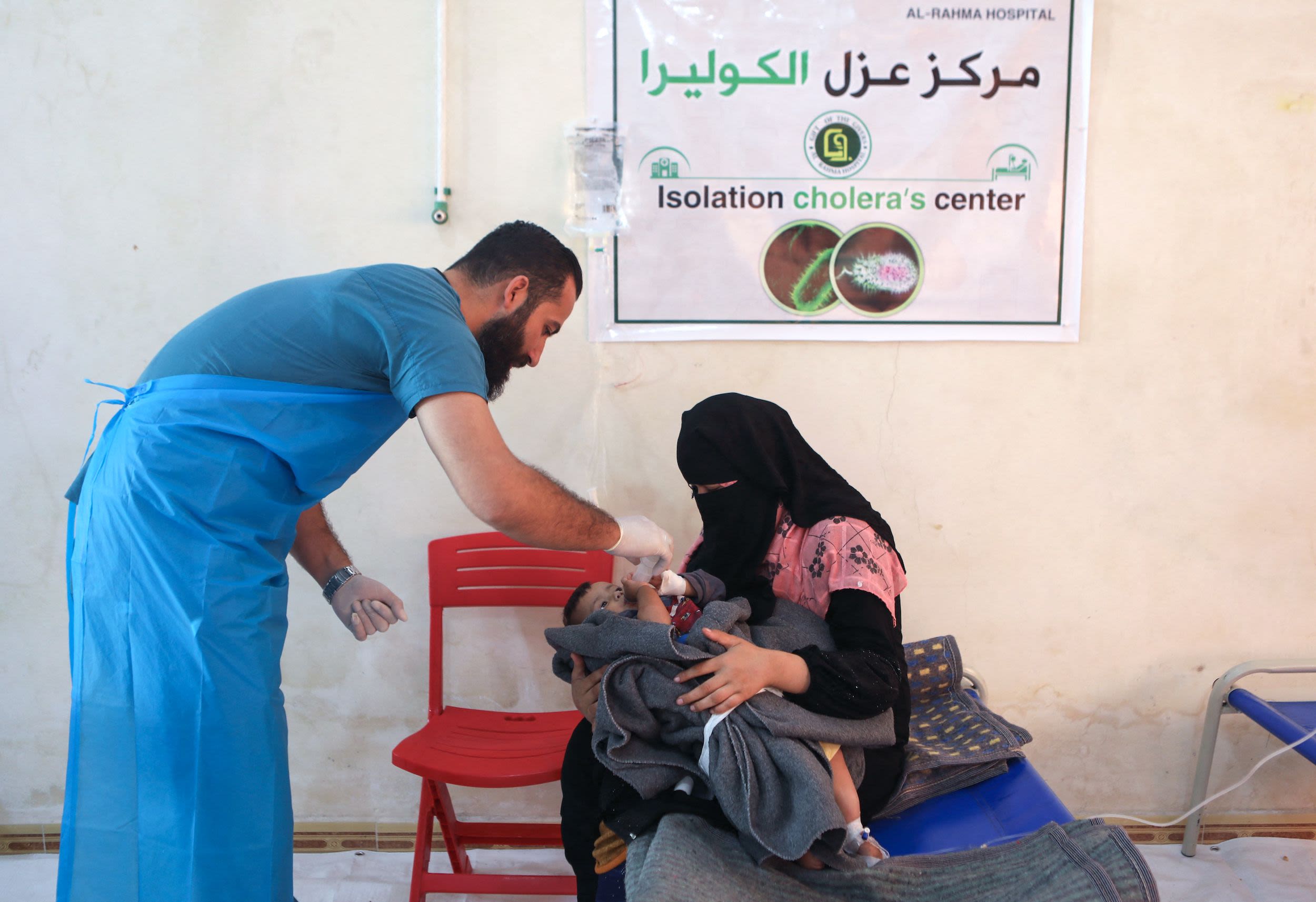
Water as a Weapon
Agreements between Syria and Turkey specify the minimum average flow of water from the Euphrates at the Syrian-Turkish border. According to the 1987 agreement between Damascus and Ankara, Syria should get 500 cubic meters of water per second from Turkey.
However, in 2021, the Syrian regime accused Turkey of depriving Syrians of their share of water from the Euphrates. Currently, the river is only supplying 200 cubic meters per second.
Turkish dams upstream have also contributed to a diminishing flow of water. Syria accuses Turkey of directly weaponizing water access by cutting water to Syrian cities, causing the Alouk water station, a critical source of water in northeast Syria, to stop generating electricity.
According to UNICEF, “some large water systems and associated electricity infrastructure are split between different areas of control, which challenges equitable water supply access for hundreds of thousands of people.”
“Water is too important to fight about,” Elizabeth Ferris, director of the Institute for the Study of International Migration in the School of Foreign Service at Georgetown University, argues. “Governments must cooperate on something so vital as water, even while they disagree, sometimes violently, over political objectives.”
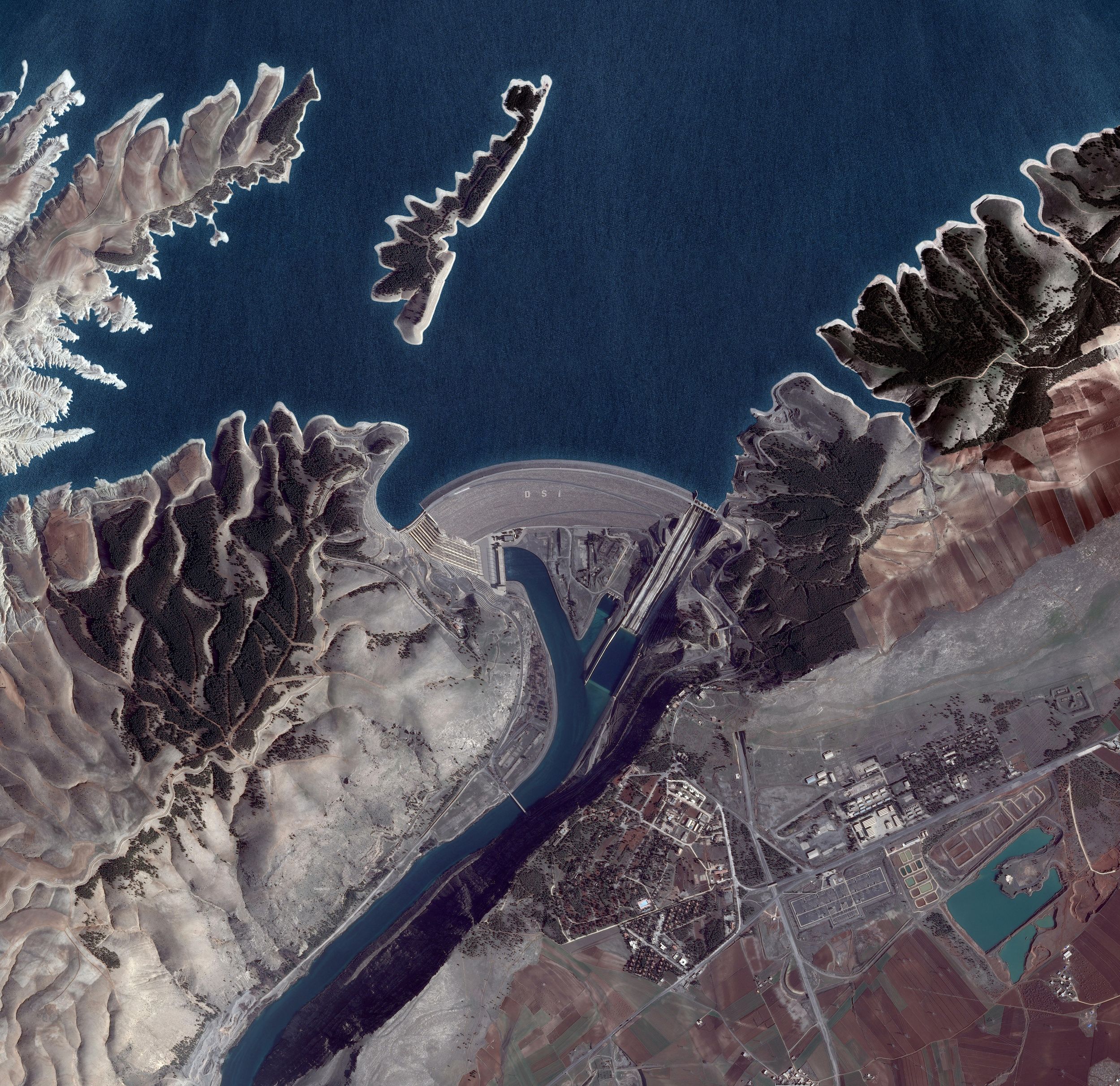
The Government
Governments typically handle these types of crises, reducing suffering and providing critical social services.
In Syria, this is not the case.
Syrians would likely feel the pain of a changing Euphrates less if the Syrian government functioned and implemented its own laws.
“The role of governments is to provide safety, security and services,” Erol Yayboke, a senior fellow with the International Security Program and director of the Project on Fragility and Mobility at CSIS, remarks. “If there were a functioning government in Syria, you would see the services provided to people increase in the face of climate change.”
These services would include critical access to clean and safe water and efforts to help communities adapt to a changing climate along the Euphrates.
The ongoing conflict in Syria has forced over 7 million people to flee abroad, with another 7 million internally displaced.
Moreover, infrastructure in the country has been badly damaged, and ongoing conflicts make reconstruction efforts unlikely in the near future.
The exclusion of specific groups from Bashar Al-Assad’s regime has resulted in many active factions within the conflict which contributes to the complexity of the war. For example, the Kurds are a large ethnic minority in Syria who live in the north of the country and in neighboring countries such as Turkey, Iraq, and Iran. Kurdish people in Syria were among the population that demonstrated against the Syrian government demanding representation in a more democratic state.
Combining these factors with the accelerating effects of climate change, Syria faces systemic risk that could trigger severe instability and threaten the state and its institutions.
“The only solution would be some kind of a political agreement, some change in government, some change in implementing the rule of law,” Ferris suggests. “That would allow people to return home or to find other long-lasting solutions for Syrians presently living as refugees in neighboring countries, such as resettlement to third countries like the U.S. and Europe.”
Moreover, infrastructure in the country has been badly damaged, and ongoing conflicts make reconstruction efforts unlikely in the near future.
The exclusion of specific groups from Bashar Al-Assad’s regime has resulted in many active factions within the conflict which contributes to the complexity of the war. For example, the Kurds are a large ethnic minority in Syria who live in the north of the country and in neighboring countries such as Turkey, Iraq, and Iran. Kurdish people in Syria were among the population that demonstrated against the Syrian government demanding representation in a more democratic state.
Combining these factors with the accelerating effects of climate change, Syria faces systemic risk that could trigger severe instability and threaten the state and its institutions.
“The only solution would be some kind of a political agreement, some change in government, some change in implementing the rule of law,” Ferris suggests. “That would allow people to return home or to find other long-lasting solutions for Syrians presently living as refugees in neighboring countries, such as resettlement to third countries like the U.S. and Europe.”
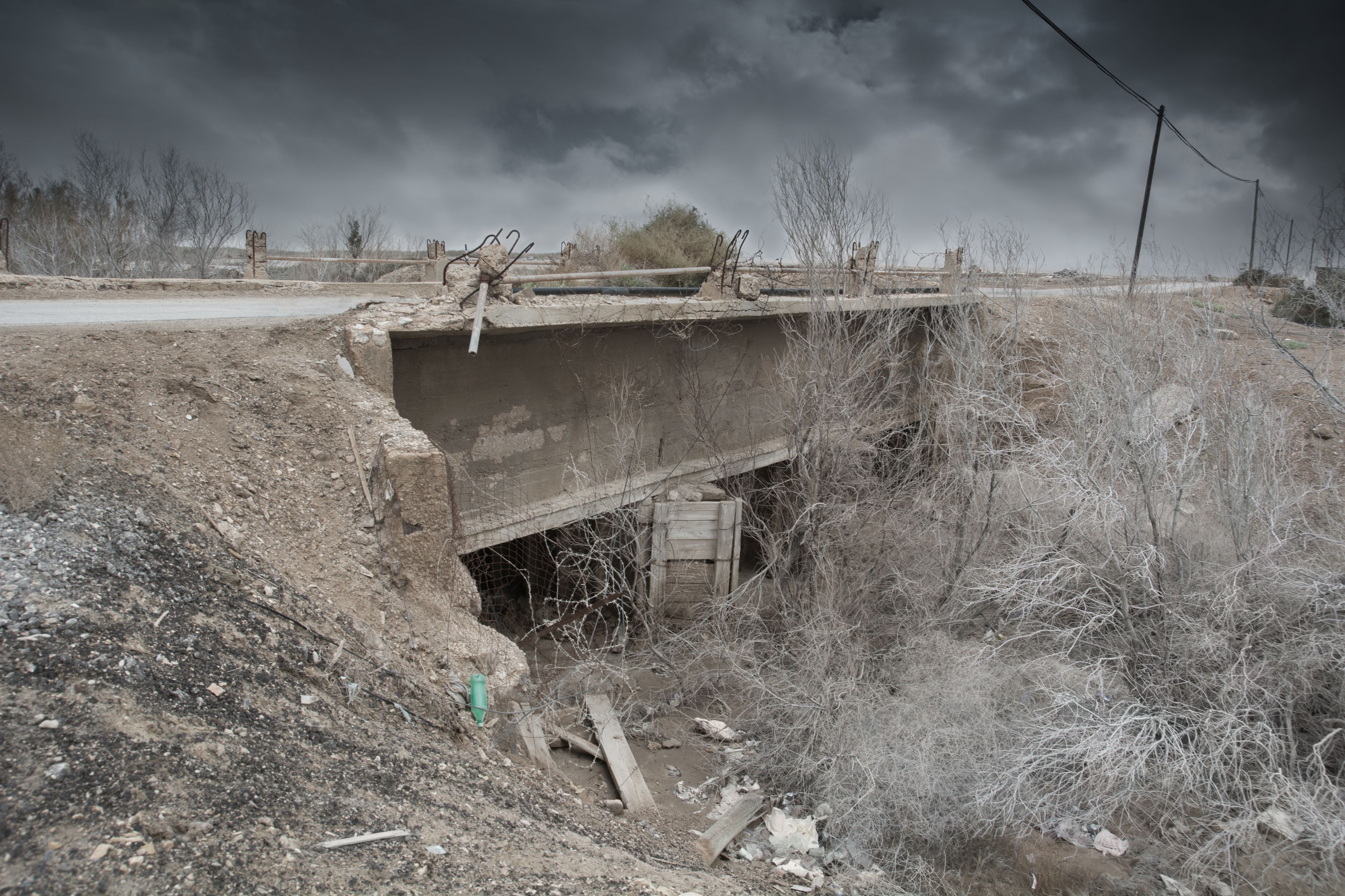
NGOs Playing a New Role
As the Syrian state remains weak, other actors are stepping up to support the Syrian people.
Non-governmental organizations (NGOs) serve a catalytic role where humanitarian aid is needed. There are various non-profit groups that operate internationally across environmental, social, and humanitarian activities.
NGOs monitor the actions of governments and can be key players in pressing governments to act according to human rights principles.
Additionally, they can improve communities by encouraging active participation among citizens and raising awareness of issues.
In recent years, NGOs have started to take a more direct interest in policymaking around the world due to natural disasters, international financial crises, and migration. Beyond simply providing aid, they are now engaging at a higher level and can serve as a stand-in government for citizens living in weak states by providing services typically provided by the government.
For more than a decade, NGOs have been collaborating with one another, as well as with governments and international bodies such as the United Nations, to conduct changemaking campaigns. Some of these are peaceful, others are more confrontational.
Syria-based NGOs also have a strong presence and have proven that not every intervention has to be global. The Covid-19 pandemic, which forced many international aid organizations out of the country, highlighted effective organizations with deep roots in their communities.
Local NGOs have carried out plenty of humanitarian work in vulnerable areas affected by the contamination and drought along the Euphrates, trying to fill the void left by the government.
While relevant ministries have enacted laws to reduce water scarcity, such as irrigation fees and penalties for farmers who overuse water, and to modernize irrigation systems, they have not been implemented.
For example, the Ministry of Housing and Construction engaged in an overarching plan to tackle problems related to the pollution of water sources with industrial and domestic waste, which was already a growing problem before 2011, but it remained on paper.
At the same time, the government has offered insufficient support to communities on a humanitarian level. There are continued reports of violations of international humanitarian law, and restrictions and bureaucratic impediments continue to hamper the work of humanitarian organizations.
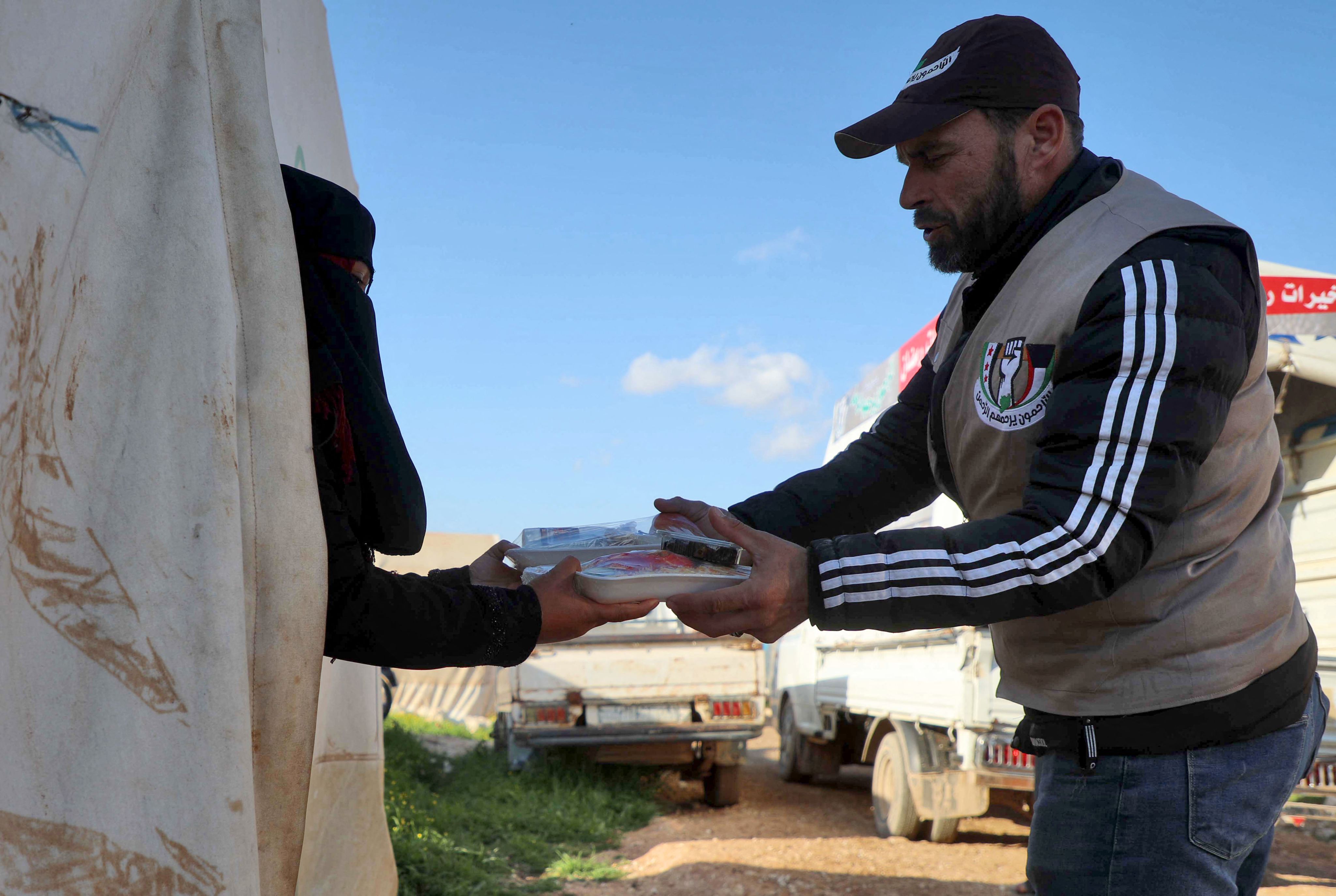
International NGOs active in Syria, such as Mercy Corps, Relief International, and UNICEF, could cooperate further with the local authorities to gain knowledge of communities and maximize the provision of assistance to the local people.
But even with such close coordination, NGOs are unlikely to fill the gap left by the weak Syrian state. “I don't think NGOs are able to single-handedly make structural changes that will lead to growth, development, and long-term peace and stability,” Tesfaye of Mercy Corps explains.
“There is only so much we can do. NGOs can’t replace the role of a state. It is the governments’ primary responsibility to face these situations, and [that] will require long-term vision and political governance reforms and foreign investments.”
Paths Forward for Syria
Cooperation at every level will also be necessary to keep the Euphrates River alive and, by extension, the Syrian people, not to mention the other countries that depend on the river. Efforts from the international community, private sector, local and international NGOs, the social and scientific communities, as well as whole-of-society efforts are all crucial to address the issues facing the Euphrates River.
Therefore, the interstate agreements regarding the Euphrates should be updated to reflect the effects of climate change, and the international community should work with those involved to facilitate these changes.
Since environmental water degradation endangers livelihoods, international support could provide local farmers with alleviating measures, from resilient seeds and to technical skills, to help them adapt to the new climate conditions.
The contribution of the private sector, by funding additional resources, is crucial. Private initiatives can offer essential means and knowledge in different sectors. For example, insurance companies can offer their expertise in weather prediction, or pharmaceutical companies can step in with vaccines to combat cholera outbreaks or provide other medicines.
Likewise, private firms could provide the technological tools needed to track water levels, contamination, and salinity. As Tesfaye highlights, “technology is really a great opportunity to do better humanitarian and development work. Mercy Corps is trying to use this information to be able to provide better services to communities.”
“Satellite data, specifically, allows us to look at certain physical features at the earth and be able to measure things better. It also helps us share that information with communities that need it.”
Expedient cooperation between NGOs at the local and international levels demonstrates the importance of such alliances. These alliances will take many shapes and forms, from international groups, to the scientific community, to religious groups, to whole-of-society efforts.
International organizations such as UNICEF could act as a bridge and provide guarantees for the establishment of a permanent NGO cooperation mechanism in Syria to address the consequences of climate change and specifically the lack of water. The international community could help contend with the climate-driven humanitarian crisis by funding such preventative initiatives. Likewise, the contribution of social and scientific communities is always helpful and must be encouraged.
Innovative digital tools can reinforce both the educational and humanitarian sector, for example, through fundraising via digital social platforms for the purchase of first aid supplies, or by coordinating virtual scientific forums for the submission of pioneering proposals and localized training initiatives.
Religious groups also have a role to play. Beyond humanitarian work, they can use their influence to work with local people who may be mistrustful of outside actors.
Finally, whole-of-society efforts can play a role in mitigating the effects of climate change. Reducing fossil fuel consumption and increasing clean energy use across Syria will play a role in preventing further pollution of the physical environment and the Euphrates River.
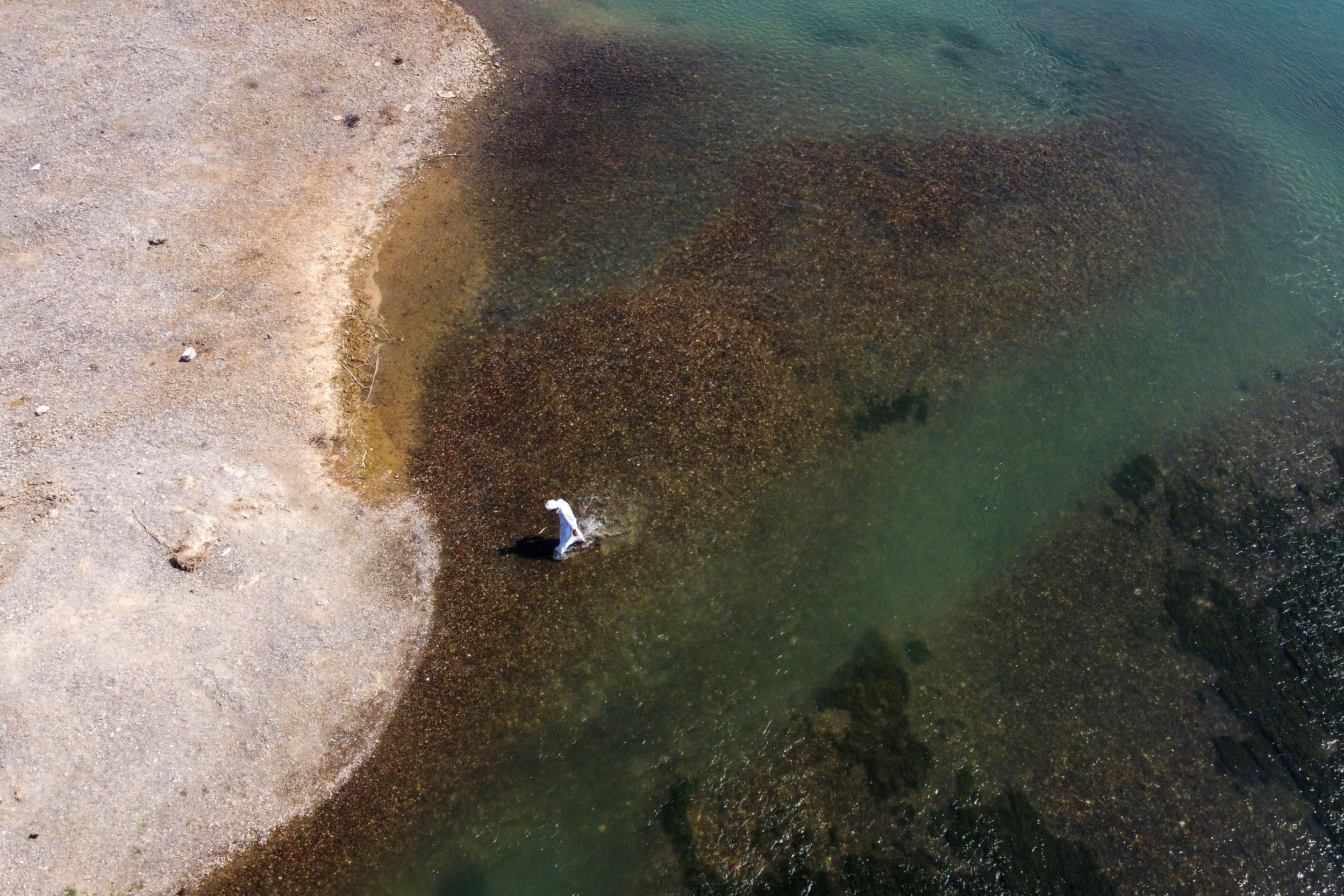
Conclusion
In the world of water, everything is connected. Change in one place inevitably has impacts both upstream and downstream.
The conditions of the Euphrates River impact not only Syria and the other countries the river flows through, but also the stability of the region. Water levels of major rivers across the globe, such as the Yangtze River in China, the Colorado River in the US, and the Rhine in Germany, have been decreasing dramatically over the last few decades.
The volatility of weather phenomena and water access is the new reality to which the world must adjust. As a universal issue, water scarcity must push governments to cooperate, create mitigation and support mechanisms, and find innovative solutions that will help those in need face the challenge.
We must learn from what is happening on the Euphrates River. International cooperation and action are the tools for the world to adapt and confront the systemic risks that climate change creates, there and everywhere.
CSIS - National & Kapodistrian University of Athens
Journalism Bootcamp Team
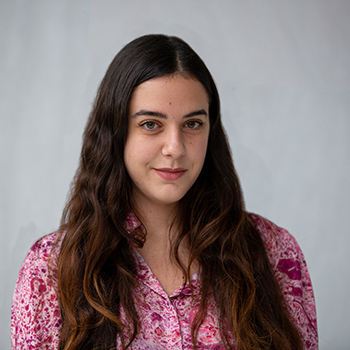
Story Team
Erasmia Arvanita is pursuing a master’s degree in Journalism and New media at the National and Kapodistrian University of Athens (UoA). She has a bachelor’s degree in Communication and Mass Media from UoA. She is a journalist and she works at reporter.gr, a website with coverage of economic news, politics, technology and more. She enjoys learning new languages and cultures and has attended various seminars and workshops about journalism, human rights and women's empowerment.

Video Team
Maria Boti has a bachelor's degree in Political Sciences from the Aristotle University of Thessaloniki and a master's degree in Journalism and New Media from the National and Kapodistrian University of Athens. She has been working as an online journalist reporting on economic, political and business issues since September 2021. Furthermore, she has been writing opinion pieces regarding social issues since 2020. In the future she would like to study in the field of digital and social media marketing.
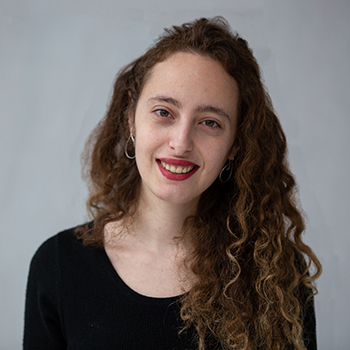
Audio Team
Danae Eleftheroglou studied International & European Studies at the University of Piraeus and has recently graduated from the National and Kapodistrian University of Athens with a master's degree in Journalism and New Media. She is a university research assistant at the National and Kapodistrian University of Athens and writes at a news site. She also has experience in the field of PR & Communication. She is passionate about politics, history and culture.
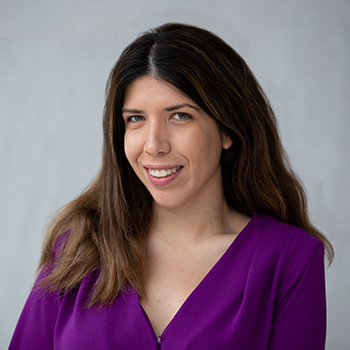
Story Team
Marianna Krasanaki graduated in 2021 from the Department of Communication and Media of the School of Economics and Political Sciences of the National and Kapodistrian University of Athens. She is continuing her postgraduate studies in the program "Journalism and New Media.” She is currently an editor newsbomb.gr, writing about breaking news, social issues, and television. She also serves as social media manager at People Language School.

Data Team
Eirini Padouva is pursuing a bachelor' s degree in "Journalism and New Media" at the National and Kapodistrian University of Athens. She is currently working on her thesis, "Freedom of expression on the Internet based on case law of the European Court of Human Rights.” She is also a graduate of the School of Law at NKUA, and this year completed the mandatory 18-month period of legal practice to obtain a lawyer's certification. For the last four years, she has volunteered in different non-governmental organizations and is currently a volunteer member of the Network of Children's Rights.

Audio Team
Vasileios Rousopoulos studied at the Department of Political Science and Public Administration of NKUA and also received a parallel degree (Minor) in Communication at Deree-The American College of Greece. He holds an MSc in Politics and Communication from the London School of Economics and Political Science. He is currently a PhD candidate at the Department of Communication and Media Studies of NKUA and works in the field of strategic communication and public relations. In addition, he works at the radio station "989 Alpha Radio".

Video Team
Thanos Sagias finished both his bachelor's degree in political science and his master's degree in journalism and new media at the University of Athens. He began working as a journalist in 2007 at in.gr, and, since 2016, has been working for the newspaper AVGI. He is learning the fundamental principles of photography, and enjoys studying video editing. Underwater filmmaking basics are his main learning objectives as he loves diving. Data journalism is the professional field in which he sees himself in the near future.
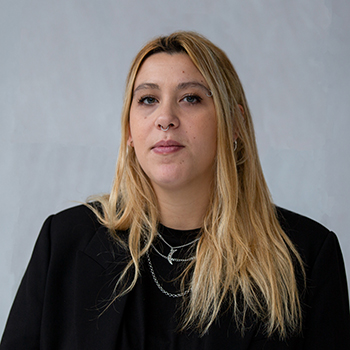
Video Team
Coralia Xepapadea has completed a bachelor's degree in Political Science and Public Administration at National and Kapodistrian University of Athens. Her thesis topic was the Greek Sixties, youth culture and subcultures. In 2022, she submitted her dissertation on 80’s Greek music magazines for the Master’s Program Journalism and New Media at NKUA. She is currently working at a Greek youth site (neolaia.gr) as an editor in chief, responsible for communication with stakeholders, online journalism, copywriting and social media management.

Story Team
Vera Zervakaki has a degree in International and European Studies from the Panteion University of Athens, and she is currently in the last semester as a master’s student in Journalism and New Media at the National and Kapodistrian University of Athens. She has been working at the Journalists’ Union of the Athens Daily Newspapers since 2002. She is Head of the Educational and Training Department, and she oversees all the programs and actions to support unemployed journalists. Through her work at the Union, she has been helping journalists adapt to the new era.
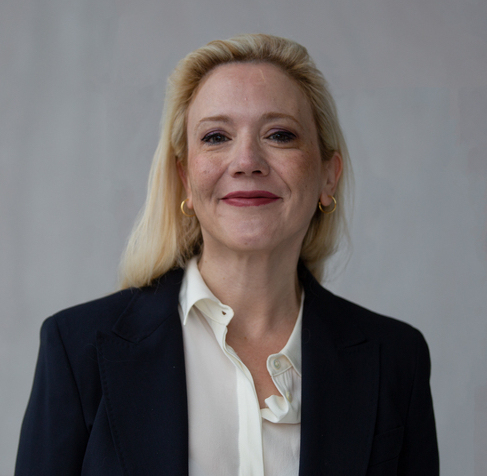
Faculty Advisor
Aikaterini Stavrianea is an assistant professor at the National & Kapodistrian University of Athens (NKUA), department of media and communications, an adjunct lecturer at the Hellenic Open University, and visiting professor at the Athens University of Economics and Business. She has published numerous articles and her research interests mainly focus on customer experience, consumer behavior, and marketing communications.
CSIS iDeas Lab Team Mentors:
- Editorial & Story Mentors: Sarah Grace and Mark Donaldson
- Audio Mentor: Marla Hiller
- Data Mentor: Jaehyun Han
- Video Mentor: Michael Kohler
Special Thanks to:
- The Stavros Niarchos Foundation (SNF)
- The CSIS AILA Team: Julieze Benjamin and Nina Tarr
- The CSIS Project on Fragility and Mobility: Erol Yayboke and Anastasia Strouboulis